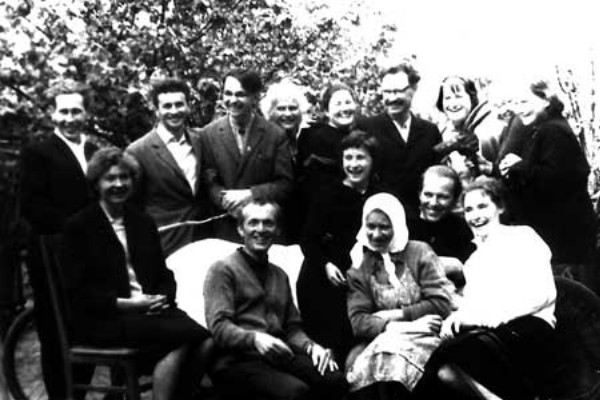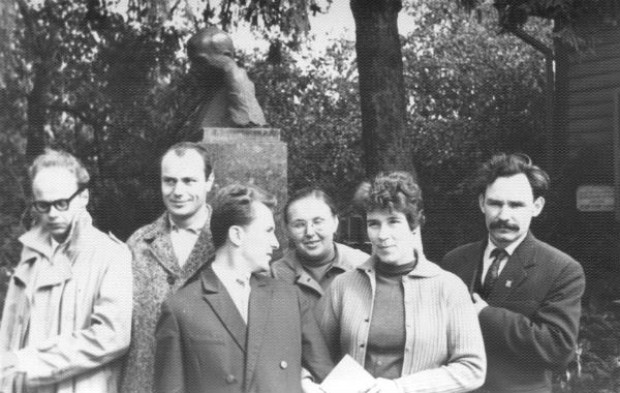Shistdesiatnyky
Shistdesiatnyky (also Shestydesiatnyky; The Sixtiers). The literary generation that began to publish in the second half of the 1950s, during Nikita Khrushchev's ‘de-Stalinization,’ and reached their literary peak in the early 1960s; hence, their name. The first representatives were Lina Kostenko and Vasyl Symonenko. Following their lead came a veritable proliferation of poets: Ivan Drach, Mykola Vinhranovsky, H. Kyrychenko, Vasyl Holoborodko, Ihor Kalynets, B. Mamaisur, and others. At first Vitalii Korotych was close to the group. The more prominent prose writers were Valerii Shevchuk, Hryhir Tiutiunnyk, Volodymyr Drozd, Yevhen Hutsalo, and Ya. Stupak, and literary critics, Ivan Dziuba, Yevhen Sverstiuk, Ivan Svitlychny, and I. Boichak. The shistdesiatnyky held their ‘literary parents’ responsible for Stalinist crimes, for adapting to a despotic regime, and for creative impotence (eg, Drach in ‘Oda chesnomu boiahuzovi’ [Ode to an Honest Coward]). In turn, some of the older writers, such as Pavlo Tychyna, Platon Voronko, Mykola Sheremet, and Mykhailo Chabanivsky, exhibited a hostile attitude to the experimentation and innovation of the shistdesiatnyky. Characteristic of shistdesiatnyky poetry was the renewal of poetic forms and subjects, which had been stamped out by the dogma of socialist realism. The prose of the group was characterized by realistic descriptions free of the constraints of socialist realism, witty humor (as in the short stories of Tiutiunnyk) or sharp satire (as in Drozd's ‘Katastrofa’ [Catastrophe] and ‘Maslyny’ [Olives]), subtle delineation of the motives of protagonists, and an interest in historical subjects (as in the works of Shevchuk).
The shistdesiatnyky movement lasted barely a decade. The writers concerned were harshly criticized at a special meeting of the creative intelligentsia as early as 1963, and they were completely silenced by the arrests of 1965–72. During the course of those repressions some individual writers went over to the official position without having offered particular resistance (eg, Vitalii Korotych, Volodymyr Drozd, and Yevhen Hutsalo). Some of them were denied permission to publish, or refused to do so for some time (Lina Kostenko, Valerii Shevchuk); others were not published again until the changes after 1985 (B. Mamaisur, Vasyl Holoborodko, Ya. Stupak). Others, who continued to oppose national discrimination and Russification and took part in the Ukrainian dissident movement, were arrested and punished with long sentences (Ivan Svitlychny, Vasyl Stus, Yevhen Sverstiuk, Ihor Kalynets, and Valerii Marchenko), whereupon some died in labor camps (Stus, Marchenko). Only Ivan Dziuba recanted, and after his release he was permitted to continue his literary work. The shistdesiatnyky movement completely died out at the beginning of the 1970s. Elements of the literary rebirth that it had initiated remained only in the works of certain poets and prose writers (Kostenko, Shevchuk). Apart from that, the shistdesiatnyky movement played an important role in popularizing samvydav literature and, most of all, in strengthening the opposition movement against Russian state chauvinism and Russification (as in Dziuba's book Internatsionalizm chy rusyfikatsiia? [Internationalism or Russification?, 1965], the essays of Sverstiuk, the samvydav poetry of many authors, especially Vasyl Symonenko and Mykola Kholodny, the accusatory leaflets and protest letters of Stus, Marchenko, and others). With the declaration of glasnost and perestroika in 1985, the shistdesiatnyky once again became active both in their own creative work and in publicistic writings in defense of the Ukrainian language and the autonomy of Ukrainian culture. Some of them, like Ivan Drach and Dziuba, became active politically in independent Ukraine.
BIBLIOGRAPHY
Koshelivets’, I. Panorama nainovishoï literatury v URSR (Munich 1963; 2nd edn, 1974)
Koshelivets’, I. Suchasna literatura v URSR (Munich 1964)
Kravtsiv, B. (ed). Shistdesiat poetiv shistdesiatykh rokiv (Munich 1967)
Luckyj, G.S.N. (ed). Discordant Voices: The Non-Russian Soviet Literatures (Oakville, Ont 1975)
Hrymych, H. Zahadka tvorchoho buntu: novelistyka ukraïns’kykh shistdesiatnykiv (Kyiv 1993)
Kasianov, H. Nezhodni: Ukraïns’ka intelihentsiia v rusi oporu 1960–80-kh rokiv (Kyiv 1995)
Bellezza, Simone Attilio. The Shore of Expectations: A Study on the Culture of the Ukrainian Shistdesiatnyky (Toronto–Edmonton 2019)
Ivan Koshelivets
[This article originally appeared in the Encyclopedia of Ukraine, vol. 4 (1993).]


